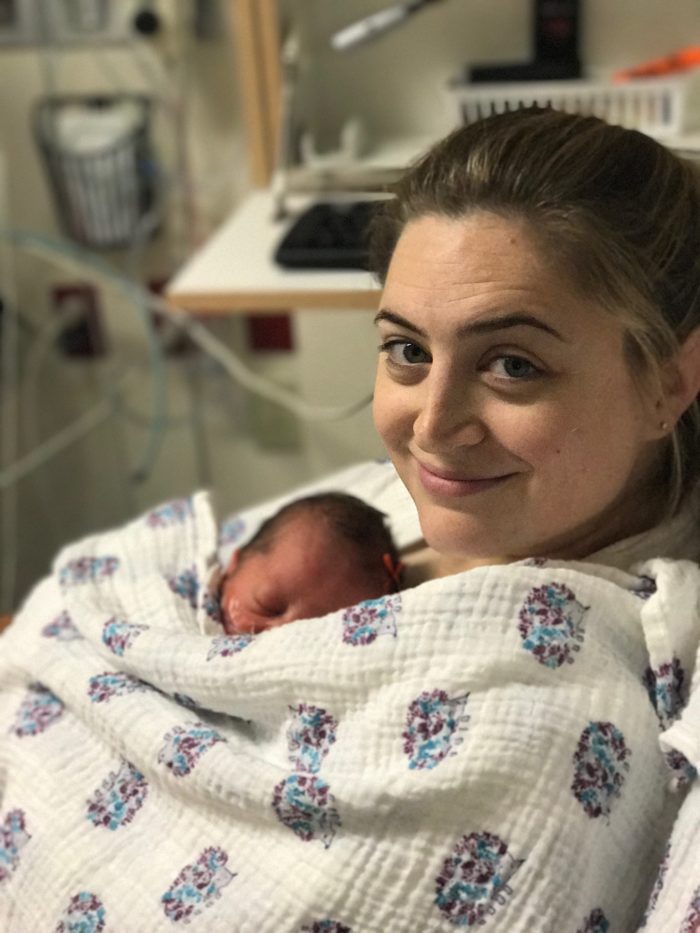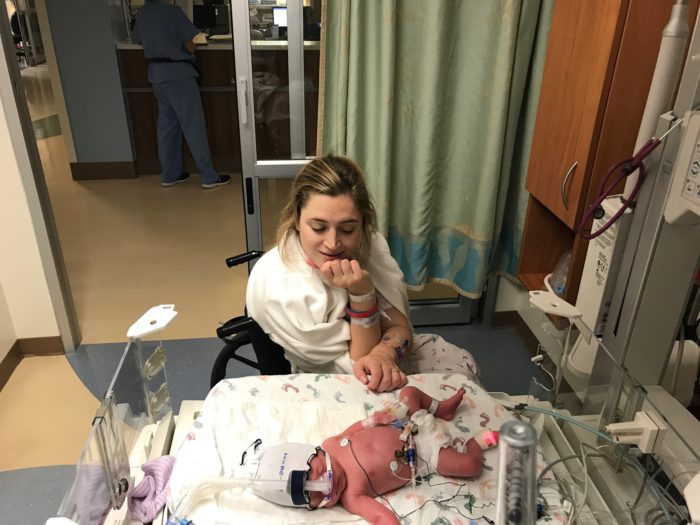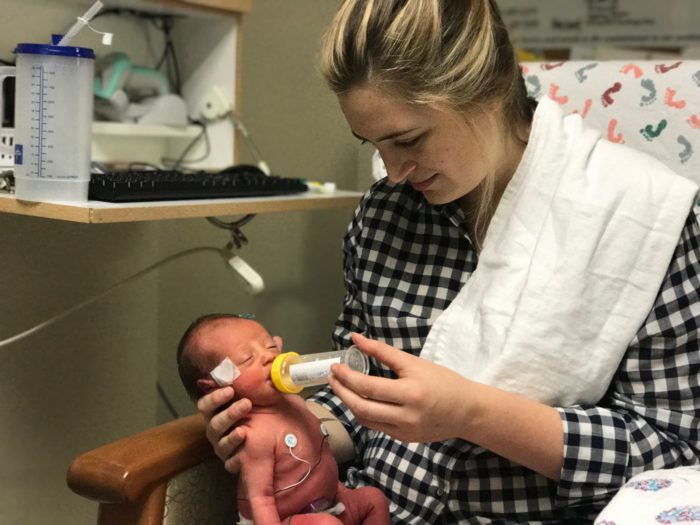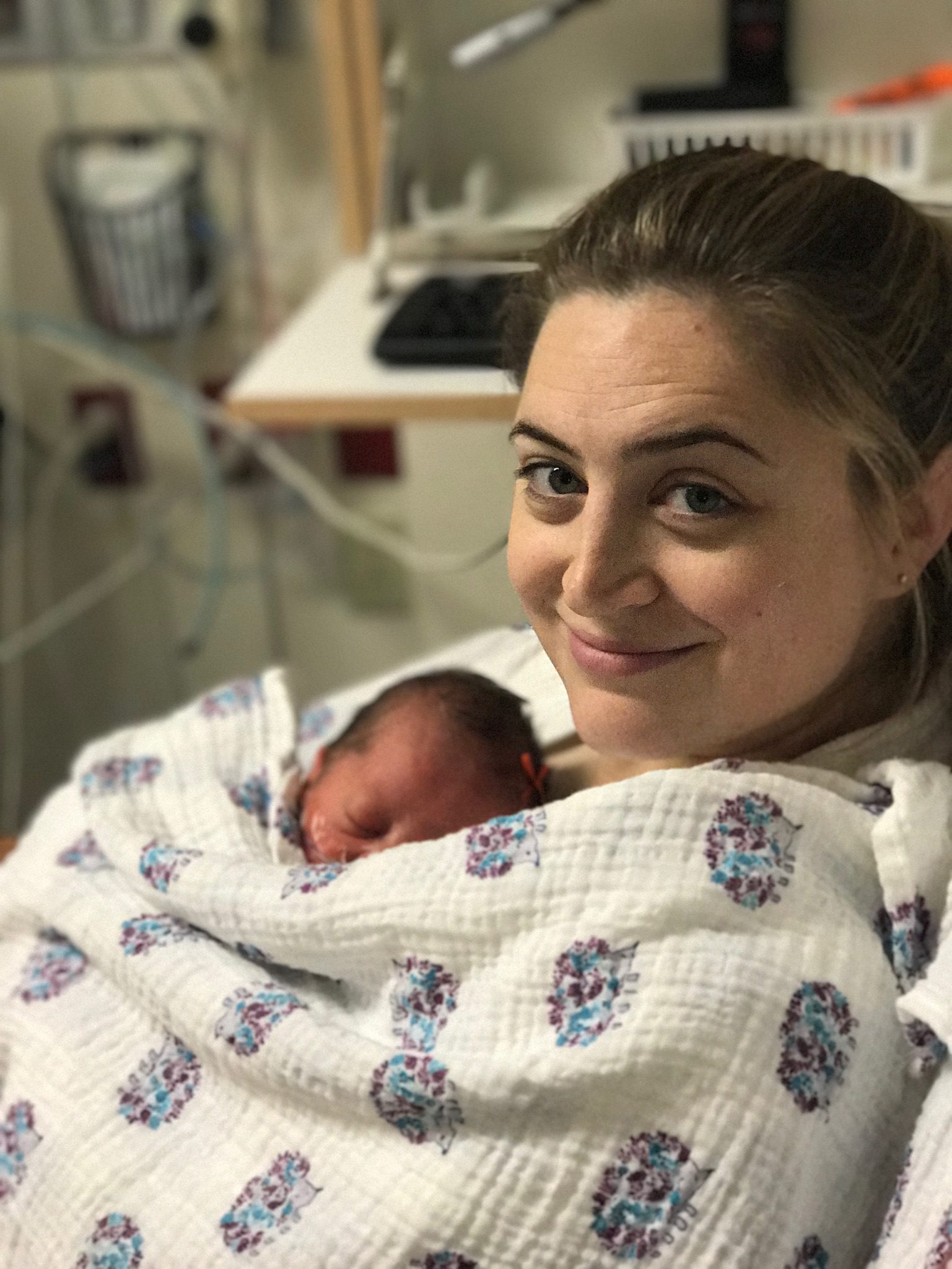
by Hadley Rolf
Having a premature baby is a uniquely overwhelming experience. This personal essay was written to be a resource for the families and friends of parents going through the experience of having an early baby—from the labor through the NICU and beyond.
One of my favorite photos of me and my daughter is from my first visit to see her in the NICU. You can barely make her out among the mass of tubes and wires.
But she is there—behind the CPAP, the NG Tube, the heart-rate and pulse-ox monitors, the IV—if hard to spot. The top of her incubator is open, and I know that in the background, just out of sight, that one of our beloved NICU nurses is about to push the button to enclose my daughter into what lovingly became known as her “little house.” And I am gazing at her from my wheelchair, still wearing my hospital gown with my own IV, in complete amazement at her tiny humanness.
There is no medical answer to the question of why my water broke at 33 weeks and 5 days. For about half of all premature deliveries, the cause is unknown. In the majority of these cases, including mine, the educated guess is that there was some sort of infection. What I know is that one minute I was sitting at my desk, and the next minute I was texting my husband to see if he thought I would need to start wearing a diaper. He didn’t. He thought, instead, that I should call my doctor.
After any “premature rupture,” you and your baby are precariously balanced. How long can you stay pregnant before your baby needs to be born? The longer your baby can stay in utero, the longer your baby has to develop and grow. On the flip side, the longer your baby stays in utero, the more chance there is to introduce (potentially additional) infection and complications. In our case, my doctors decided to delay my daughter’s entrance a maximum of 48 hours. At the end of that countdown, if I hadn’t already naturally gone into labor, I would be induced.
During the growing suspense that followed, I was put on a drip of antibiotics and given two doses of a corticosteroid called betamethasone to help with my daughter’s development. Fifty-seven hours later, my daughter greeted a large audience. We had the labor and delivery team alongside a team from the NICU, which included a neonatologist and two nurses. When she entered the world and immediately cried, the entire room cheered.
We had been told prior to her birth to prepare for at least six weeks in the NICU. The rule of thumb is that babies need to be in the NICU for as long as they would have needed to be in the womb. This did not end up being true for our daughter. After only a few days in the NICU, she became known as a “feeder/grower,” a baby who remains in the hospital only so that she can learn to eat and gain weight. She had no other medical difficulties. The mantra of her stay quickly became, “Suck. Swallow. Breathe. Suck. Swallow. Breathe.” A baby born at 34 weeks has not developed a mature sucking ability, and many are unable to properly latch or take a bottle. A baby born at 34 weeks also is easily tired. The energy demanded to suck, swallow, and breathe in one fluid motion is often too much to complete an entire feeding.
After seven days, we were discharged into our new reality—parents to a five-pound force of nature.
One of the biggest misconceptions about premature babies is that the drama of their story concludes when they are discharged from the hospital. How I wish that were true. My daughter is now 18 months old or, as I often find myself saying, 16 months “adjusted.” Adjusted age is the age your baby would have been if he or she was born full-term. Development milestones are measured against adjusted age. I have often found myself using my daughter’s adjusted age in place of her actual age as a defense to prying questions—usually asked with good intentions!—about her small size or her verbal or physical progress. “Is she walking yet?” often left me close to tears around her first birthday. One of the hardest moments I have had as a parent happened at a playdate with friends whose babies were about the same age as my then 6-month-old. Their babies were sitting on their own, playing with toys, eating solid foods, and babbling—all things I would still await for months. I felt so desperately alone and reflexively protective.


I understand that in many, many ways my family has been fortunate. My daughter’s NICU stay was brief; we live in a city with a top-notch children’s hospital; her developmental delays have been relatively minor; and we have been able to take full advantage of progressive early intervention programs available at no cost in our state.
And yet, as much as I love the photo of the two of us at our first true meeting, I still can’t look at it without at least a few tears. Everything about the experience is so raw. I physically ache for the day when I forget—even if just for a moment—that my daughter was born too early. I hope that day comes soon.
Hadley Rolf lives in Denver, CO (by way of Kansas, North Carolina, and New York) with her husband, daughter, and geriatric dog. When she isn’t dancing to “Baby Shark,” she likes to read Young Adult fiction, teach herself to cook, and binge-watch BBC procedurals.
Thank you, Hadley. I really appreciate your sharing your story for others who might be going through the same thing. I have watched a few friends go through the process of delivering early and spending time with a baby in a NICU, and have seen how it can be frightening and exhausting. I can’t imagine what that must feel like. If any readers feel comfortable commenting with stories of your own, that would be most welcome. You can find more about Hadley’s experience in an essay on Mama Wellness.
P.S. More Family posts: On Being a Sister, and How to Hold Someone Else’s Newborn.






































10 Comments